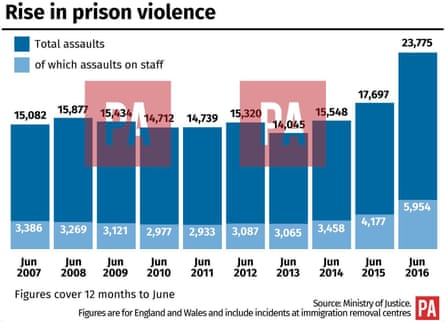The Ministry of Justice has explicitly acknowledged that staff cuts are a factor in the rising tide of violence in prisons in England and Wales.
The latest figures show that self-inflicted deaths inside jails rose 13% to a record 107 in the 12 months to September, and assaults behind bars increased by more than 34% to 23,775 – about 65 per day – in the 12 months to the end of June 2016. Incidents of self-harm, another key indicator of prison safety, rose by 26% to 36,400 reported incidents in the year to June.
The MoJ figures show an increasingly volatile situation in women’s prisons, with the number of self-inflicted deaths doubling from four to eight in the past 12 months and assaults rising by 25% in a year.
“The rise in assaults since 2012 has coincided with major changes to the regime, operating arrangements and culture in public sector prisons,” says an MoJ commentary on the prison safety figures published on Thursday. “For example, restructuring of the prison estate, including staff reductions, which have reduced overall running costs, and an increase in gang culture and illicit psychoactive drugs in prisons.
“As well as the dangers to both physical and mental health, trading in these illicit drugs can lead to debt, violence and intimidation.”

The justice secretary, Elizabeth Truss, said the figures demonstrated the gravity of the problem of violence and self-harm in prisons. “The consequences are devastating and go far beyond the confines of the prison walls, spilling out into our streets and communities,” she said.
“Prison reform is my top priority. I am committed to making prisons places of safety and reform, where our dedicated officers are given the support they need to help offenders turn their lives around. That is why I have invested an initial £14m at 10 of our most challenging prisons, and shortly I will be publishing a white paper outlining the much-needed reform across the prison estate to 2020 and beyond.” Mark Day, of the Prison Reform Trust, said the figures revealed “a hidden emergency unfolding in our prison system”. He said the rise in prison violence over the last three years could not be allowed to become the new normal.
“The government’s forthcoming prison safety and reform plan must get to grips with a dangerously deteriorating situation. The lives of people who live and work in prison depend on it,” he said.
Frances Crook, of the Howard League for Penal Reform, said: “Cutting staff and prison budgets while allowing the number of people behind bars to grow unchecked has created a toxic mix of violence, death and human misery … Today’s figures show that we cannot wait for legislation – bold and radical action is needed now to stop the death toll rising further.”









